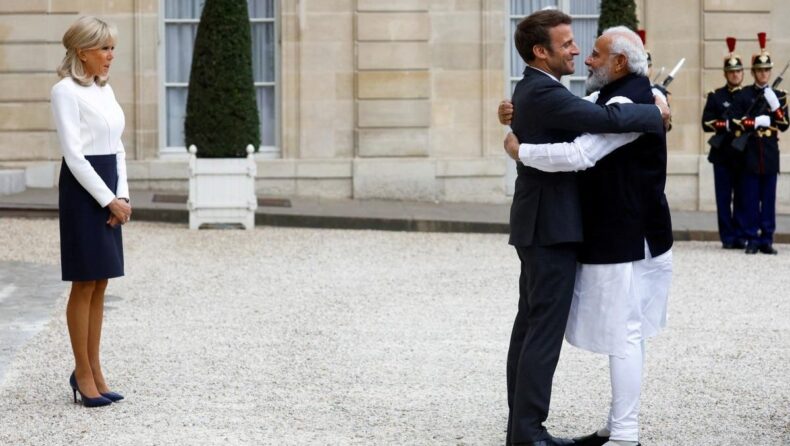MODI’S FRANCE VISIT: India and France have urged for an immediate suspension of hostilities in the Russia-Ukraine conflict in order to bring parties together and foster conversation and diplomacy in order to put an end to the people’s suffering.
Prime Minister Modi returned home early Thursday following a three-nation European visit during which he had a number of bilateral talks to strengthen connections in a variety of areas, including trade, energy, and green technology.
Earlier this year, the two nations released a joint statement calling for the promotion of communication and diplomacy following meetings between Prime Minister Narendra Modi and French President Emmanuel Macron here on Wednesday, May 4, 2022.
The two presidents engaged in extensive bilateral and global discussions and agreed on an ambitious agenda for the India-France Strategic Partnership’s next phase. France repeated its “vehement denunciation” of Russia’s “unlawful and unjustified attack against Ukraine,” according to the joint statement.
According to the statement, India and France voiced “grave concern” over the continued hostilities and humanitarian disaster in Ukraine.
“They clearly denounced civilian casualties in Ukraine and urged an urgent suspension of hostilities in order to bring parties together to encourage discussion and diplomacy in order to put an end to the people’s suffering,” the statement added.
Both countries also emphasized the importance of upholding the United Nations Charter, international law, and states’ sovereignty and territorial integrity, the statement said.
Mr. Modi and Mr. Macron exchanged views on the regional and global repercussions of the Ukraine crisis and decided to further up collaboration on the subject.
India and France have voiced grave worry about the ongoing deterioration of global food security and nutrition, which are already being damaged by the Covid-19 epidemic, particularly in underdeveloped nations.
The two countries are committed to facilitating a coordinated, multilateral response to the risk of an aggravated food crisis as a result of the Ukraine conflict, including through initiatives such as the Food and Agriculture Resilience Mission (FARM), which aims to ensure well-functioning markets, solidarity, and long-term resilience.
Foreign Secretary Vinay Kwatra stated at a media conference on Prime Minister Modi’s visit to France that there was a wide understanding of each other’s positions on Ukraine.
“Both leaders recognized the crucial need for close collaboration and engagement. As a result, both India and France would be able to contribute positively to the emerging situation “he clarified.
When asked whether there were any conversations about how India and France might utilize their relationship and influence to bring the Russia-Ukraine war to a conclusion, Kwatra stated that the two presidents discussed the events in Ukraine and shared thoughts on them.
“Prime Minister Modi presented a thorough explanation of the space from which the Indian position emerged…which calls for an immediate cessation of hostilities and a resolution of the current issue via diplomacy and discourse,” he added.
The two presidents also discussed extensively and exchanged opinions on the cascading effect of the Ukraine crisis on global food shortages, commodity shortages such as fertilizer, and how the two nations might collaborate to address some of these very real and felt difficulties on the ground, Kwatra added.
“They have a very clear grasp of one another’s positions, and they have agreed to maintain tight contact and coordination. So that as the situation progresses, individuals may both individually and collectively play a positive part in resolving all of the issues I mentioned,” he added.
Mr. Modi, who was in Paris as part of his three-nation European visit, addressed bilateral and mutual interests, as well as regional and global events, with Macron. Mr. Macron met privately with Modi prior to the delegation-level meetings at the Elysee Palace, the French President’s official residence.
Mr. Modi’s travel to Europe took place against the backdrop of the Ukraine crisis, which has galvanized much of the continent against Russia.
Ukraine was also a major topic of discussion at Wednesday’s second India-Nordic summit in Copenhagen, which was attended by Prime Minister Modi and his Nordic counterparts from Finland, Iceland, Sweden, Norway, and Denmark.
Mr. Modi earlier indicated in Berlin that India believes no country would emerge victorious from the Russia-Ukraine conflict since everyone will suffer losses and the fight will have a “disproportionate” impact on developing and poor countries.
Additionally, the two nations (India and France) have emphasised the need of “zero tolerance” for the use of Afghan land to propagate terrorism in other areas of the globe, and both have promised to collaborate on this problem, including in the United Nations Security Council.
A joint statement published following meetings between Prime Minister Narendra Modi and French President Emmanuel Macron expressed grave concern about the humanitarian situation and violations of human rights in Taliban-led Afghanistan and emphasised the importance of an inclusive administration in Kabul.
No country has recognized the Taliban-led all-male government since the hardline Islamists reclaimed control in August last year, 20 years after it was deposed in a US-led assault.
“India and France expressed grave concern about the humanitarian situation and human rights violations in Afghanistan and reaffirmed their strong support for a peaceful, secure, and stable Afghanistan, emphasizing the importance of respecting the country’s sovereignty, unity, and territorial integrity, as well as refraining from interfering in its internal affairs,” the statement stated.
Since seizing control of the Afghan government, the Taliban have enforced rights-violating policies that have erected enormous hurdles to women’s and girls’ health and education, restricted their freedom of movement, speech, and association, and robbed them of earned money.
Edited By : Khushi Thakur
Published By : Shubham Ghulaxe













